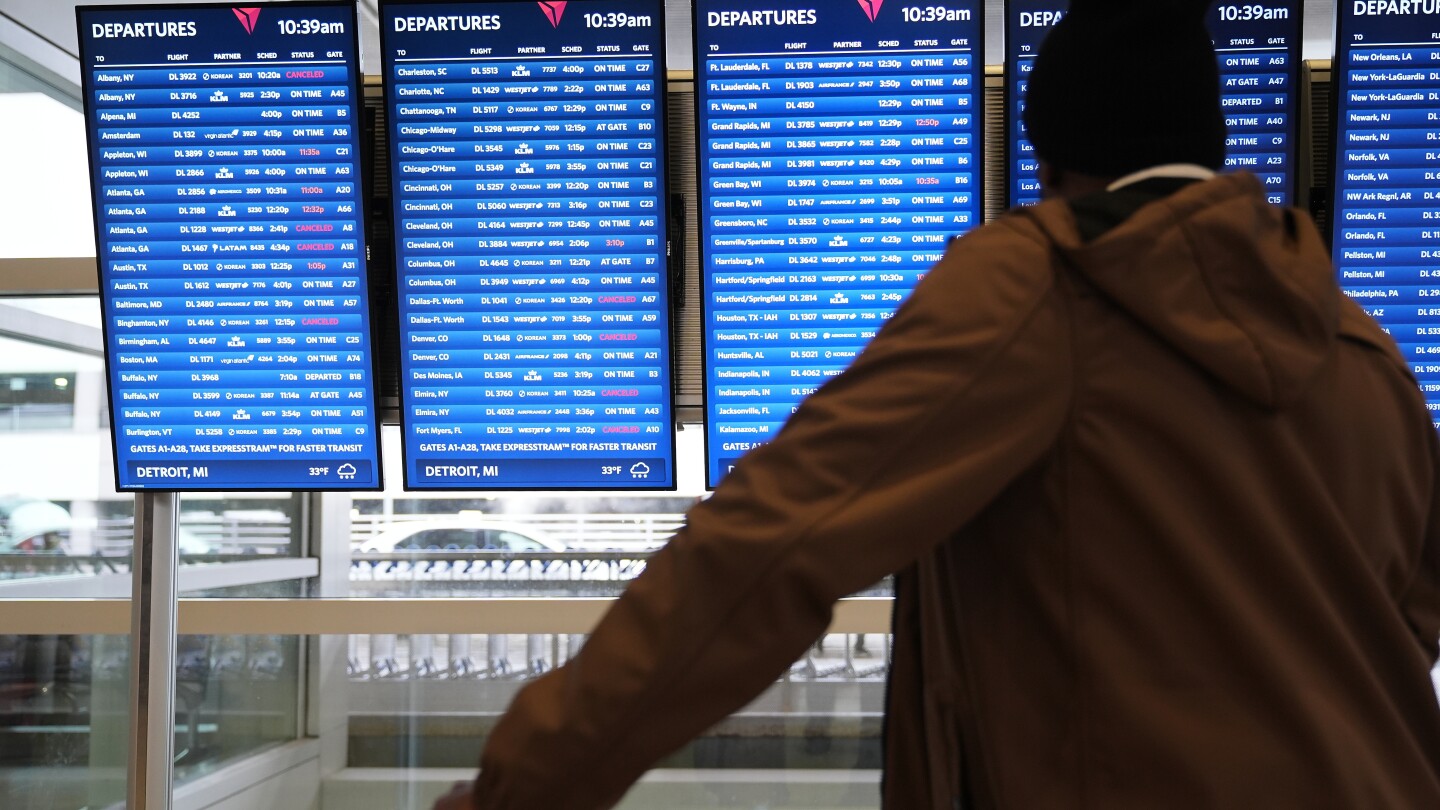US air traffic faces Thanksgiving delays amid federal shutdown
WASHINGTON (AP) — U.S. airlines canceled more than 2,100 flights Sunday mostly because of the government shutdown and the Federal Aviation Administration’s order to reduce air traffic.
The slowdown at 40 of the nation’s busiest airports is now in its third day and beginning to cause more widespread disruptions. That includes more than 7,000 additional delays Sunday alone, according to FlightAware, a website that tracks air travel disruptions.
More than 1,000 flights were canceled Friday, and more than 1,500 more on Saturday.
Earlier Sunday, U.S. Transportation Secretary Sean Duffy warned that U.S. air traffic could “slow to a trickle” if the shutdown if the federal government shutdown lingers into the busy Thanksgiving travel holiday season.
The Federal Aviation Administration last week ordered flight cuts at the nation’s busiest airports as some air traffic controllers, who have gone unpaid for nearly a month, have stopped showing up for work.
The reductions started Friday at 4% and will increase to 10% by Nov. 14. They are in effect from 6 a.m. to 10 p.m. local time and will impact all commercial airlines.
On Sunday, more than 2,100 flights were canceled and more than 7,000 flights were delayed, according to the aviation tracking website FlightAware. That follows more than 1,500 cancellations on Saturday.
Hartsfield-Jackson International Airport in Atlanta had the most cancellations Sunday, with 173, followed by Newark Liberty International Airport in New Jersey, with 115.
The FAA said staffing shortages at Newark and LaGuardia Airport in New York were leading to average departure delays of about 75 minutes.
Detroit Metropolitan Wayne County Airport in Michigan was mostly empty Sunday morning, with minimal wait times at security checkpoints as delays and cancellations filled the departures and arrivals boards.
Duffy has said additional flight cuts — perhaps up to 20% — might be needed, particularly after controllers receive no pay for a second straight pay period.
“More controllers aren’t coming to work day by day, the further they go without a paycheck,” Duffy told “Fox News Sunday.”
And he prepared Americans for what they could face during the busy Thanksgiving holiday.
“As I look two weeks out, as we get closer to Thanksgiving travel, I think what’s going to happen is you’re going to have air travel slow to a trickle as everyone wants to travel to see their families,” Duffy said.
With “very few” controllers working, “you’ll have a few flights taking off and landing” and thousands of cancellations, he said.
“You’re going to have massive disruption. I think a lot of angry Americans. I think we have to be honest about where this is going. It doesn’t get better,” Duffy said. “It gets worse until these air traffic controllers are going to be paid.”
The government has been short of air traffic controllers for years, and multiple presidential administrations have tried to convince retirement-age controllers to remain on the job. Duffy said the shutdown has exacerbated the problem, leading some air traffic controllers to speed up their retirements.
“Up to 15 or 20 a day are retiring,” Duffy said on CNN.
Duffy said Defense Secretary Pete Hegseth texted him with an offer to lend military air traffic controllers, but it’s unclear whether the staff is certified to work on civilian systems.
Duffy denied Democratic charges that the flight cancellations are a political tactic, saying they were necessary due to increasing near-misses from an overtaxed system.
“I needed to take action to keep people safe,” Duffy said. “I’m doing what I can in a mess that Democrats have put in my lap.”
Airlines for America, a trade group representing U.S. carriers, said air traffic control staffing-related delays exceeded 3,000 hours on Saturday, the highest of the shutdown, and that staffing problems contributed to 71% of delay time.
From Oct. 1 to Nov. 7, controller shortages have disrupted more than 4 million passengers on U.S. carriers, according to Airlines for America.


